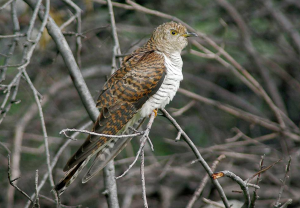Lockdown has been a long and difficult process for many people, with thousands finding solace and calm in nature. Whilst some absorb the richness of their local environment through visual means, there’s an experience we should all learn to embrace which allows for productivity and creativity to flow.
May 21st signals the start of Gökotta, a Swedish concept that simply translates; “to rise early at dawn in order to go out and bathe in bird song”.
Across Sweden the act of Gökotta starts on Ascension Day, 40 days after Easter, and sees large communities head out to listen to the rich chorus of bird song that welcomes in the spring. In particular, the Cuckoo is a much sought after sound with churches in many parts of the country holding their Ascension morning services outside specifically so members can hear their first Cuckoos of the year.
Across the world, with mental health issues on the rise and more and more people feeling a greater disconnect from the natural world, could Gökotta be the process that allows those fractures to heal? Research has shown that even small amounts of exposure to bird song can be hugely beneficial, boosting mental wellbeing by up to 4 hours each day. A dawn chorus can be enjoyed anywhere, you just need to be prepared to get up with the lark and begin listening before sunrise.
But what can Gökotta teach us? For many, the dawn chorus is a finite daily event that see’s the same birds, singing the same songs in the same places, but this is inaccurate. Over time dawn choruses all over the world have changed, not least here in the UK as species like Turtle Dove, Nightingale, Yellowhammer and Wood Warbler are all but gone from many people’s morning soundscapes. At coastal sites where displaying Redshank and singing Curlew were once part of the early morning crescendo, the calls of newly establishing Mediterranean Gulls can now be heard instead. But what we lose in some species we gain in others with Firecrest, Blackcap and Common Whitethroat all seeing dramatic increases in many parts of the country, providing a different structure to the mornings proceedings compared to 30 years ago.
With Gökotta officially finishing on June 21st, why not get out and practice this new bathing technique over the next month to see and hear how this Swedish tradition can focus your mind and expand your learning?
To learn more about the experience of Gökotta visit the sound approach website – https://soundapproach.co.uk/gokotta/
To practice the art of Gökotta the Sound Approach have provided 10 dawn chorus’s from across the Western Palearctic that can be enjoyed here –
Common Cuckoo Cuculus canorus Sigri, Lesbos, Greece, 21 April 2002 (René Pop).

You might also like...
Harbour Update – posted 26/07/24
It was good to get that dank, yucky murk out of the way, which allowed for some new…
Find out moreHarbour Update – posted 25/07/24
You should never right off a good days birding because of the weather, because you just never know….
Find out moreCall 01202 641 003
© 2024 Birds of Poole Harbour Registered Charity No. 1152615
